Owing to TWO heART-working journalists at the WAshington POst, the famous/infamous WATERGATE scandal led to the RESIGNATION OF THE FIRST AMERICAN PRESIDENT, NIXON, you do remember?
FRom malaysiakini.com;
Desi is not a subscriber, I indirectly C&Pastried from Googling, OK!:~~~~
The Wall Street Journal's series of reports on alleged
financial scandals linked to Prime Minister Najib Abdul Razak and
state-owned fund 1MDB has made it on the Pulitzer Prize nomination list
in the International Reporting category.
"Our coverage of 'Malaysia's Watergate' #1MDB was a Pulitzer prize finalist in the category of International Reporting," WSJ tweeted this morning.
According to the Pulitzer Prize official website, the WSJ had submitted a series of articles published between July and December last year - written by Tom Wright, Bradley Hope, Simon Clark, Mia Lamar and James Hookwood.
They were credited for their work which was described as "masterful reporting that exposed corruption at the highest levels of a fragile democracy, leading to Malaysia's Watergate".
Among others, the articles submitted were headlined "Malaysia Leader's Accounts Probed" (July 2), "Leader Faces Fire Over Fund" (Oct 15), and "The Money Network of Malaysian Politics" (Dec 28).
Najib and his supporters from the ruling BN have repeatedly accused the paper of peddling false accusations and being used by those with a political agenda to topple the government.
However, WSJ has continued to stand by its reports until today and supported calls for Najib to file a defamation suit against any allegedly false report.
The Pulitzer Prize awards were presented to the winners on Monday.
The Pulitzer Prize board awarded Alissa Rubin from The New York Times its international reporting award for her 2015 work in Afghanistan.
Our coverage of "Malaysia's Watergate" #1MDB was a Pulitzer finalist in the category of international reporting https://t.co/6o4dNAHhA6
— Wall Street Journal (@WSJ) April 18, 2016
FRom malaysiakini.com;
Desi is not a subscriber, I indirectly C&Pastried from Googling, OK!:~~~~
1MDB reports earn WSJ Pulitzer Prize nomination
"Our coverage of 'Malaysia's Watergate' #1MDB was a Pulitzer prize finalist in the category of International Reporting," WSJ tweeted this morning.
According to the Pulitzer Prize official website, the WSJ had submitted a series of articles published between July and December last year - written by Tom Wright, Bradley Hope, Simon Clark, Mia Lamar and James Hookwood.
They were credited for their work which was described as "masterful reporting that exposed corruption at the highest levels of a fragile democracy, leading to Malaysia's Watergate".
Among others, the articles submitted were headlined "Malaysia Leader's Accounts Probed" (July 2), "Leader Faces Fire Over Fund" (Oct 15), and "The Money Network of Malaysian Politics" (Dec 28).
Najib and his supporters from the ruling BN have repeatedly accused the paper of peddling false accusations and being used by those with a political agenda to topple the government.
However, WSJ has continued to stand by its reports until today and supported calls for Najib to file a defamation suit against any allegedly false report.
The Pulitzer Prize awards were presented to the winners on Monday.
The Pulitzer Prize board awarded Alissa Rubin from The New York Times its international reporting award for her 2015 work in Afghanistan.
Our coverage of "Malaysia's Watergate" #1MDB was a Pulitzer finalist in the category of international reporting https://t.co/6o4dNAHhA6
— Wall Street Journal (@WSJ) April 18, 2016
Watergate Scandal
From history.com, some key facts RECALLED:~~~~~

Introduction
Early in the morning of June 17, 1972, several burglars were
arrested inside the office of the Democratic National Committee (DNC),
located in the Watergate building in Washington, D.C. This was no
ordinary robbery: The prowlers were connected to President Richard
Nixon’s reelection campaign, and they had been caught while attempting
to wiretap phones and steal secret documents. While historians are not
sure whether Nixon knew about the Watergate espionage operation before
it happened, he took steps to cover it up afterwards, raising “hush
money” for the burglars, trying to stop the Federal Bureau of
Investigation (FBI) from investigating the crime, destroying evidence
and firing uncooperative staff members. In August 1974, after his role
in the Watergate conspiracy had finally come to light, the president
resigned. His successor, Gerald Ford, immediately pardoned Nixon for all
the crimes he “committed or may have committed” while in office.
Although Nixon was never prosecuted, the Watergate scandal changed
American politics forever, leading many Americans to question their
leadership and think more critically about the presidency.
Watergate: The Break-In
The origins of the Watergate break-in lay in the hostile politics of
the 1960s. By 1972, when Republican President Richard Nixon (1913-1994)
was running for reelection, the United States was embroiled in the Vietnam War
(1955-1975) and deeply divided internally. In such a harsh political
climate, a forceful presidential campaign seemed essential to the
president and some of his key advisers. Their aggressive tactics
included what turned out to be illegal espionage. In May 1972, as
evidence would later show, members of Nixon’s Committee to Re-Elect the
President (known derisively as CREEP) broke into the Democratic National
Committee’s Watergate headquarters, stole copies of top-secret
documents and bugged the office’s phones.
The wiretaps failed to work properly, however, so on June 17 the group returned to the Watergate building. As the prowlers were preparing to break into the office with a new microphone, a security guard noticed that they had taped the building’s locks. The guard called the police, who arrived just in time to catch the spies red-handed.
It was not immediately clear that the burglars were connected to the president, though suspicions were raised when detectives found copies of the reelection committee’s White House phone number among the burglars’ belongings. In August, Nixon gave a speech in which he swore that his White House staff was not involved in the break-in. Most voters believed him, and in November the president was reelected in a landslide.
The wiretaps failed to work properly, however, so on June 17 the group returned to the Watergate building. As the prowlers were preparing to break into the office with a new microphone, a security guard noticed that they had taped the building’s locks. The guard called the police, who arrived just in time to catch the spies red-handed.
It was not immediately clear that the burglars were connected to the president, though suspicions were raised when detectives found copies of the reelection committee’s White House phone number among the burglars’ belongings. In August, Nixon gave a speech in which he swore that his White House staff was not involved in the break-in. Most voters believed him, and in November the president was reelected in a landslide.
Watergate: The Cover-Up
It later came to light that Nixon was not being truthful. A few days
after the break-in, for instance, he arranged to provide hundreds of
thousands of dollars in “hush money” to the burglars. Then, he and his
aides hatched a plan to instruct the Central Intelligence Agency (CIA)
to impede the FBI’s investigation of the crime. This was a more serious
crime than the break-in: It was an abuse of presidential power and a
deliberate obstruction of justice. Meanwhile, seven conspirators were
indicted on charges related to the Watergate affair. At the urging of
Nixon’s aides, five pleaded guilty and avoided trial; the other two were
convicted in January 1973.
By that time, a growing handful of people—including Washington Post reporters Bob Woodward and Carl Bernstein, trial judge John J. Sirica and members of a Senate investigating committee—had begun to suspect that there was a larger scheme afoot. At the same time, some of the conspirators began to crack under the pressure of the cover-up. Some of Nixon’s aides, including White House counsel John Dean, testified before a grand jury about the president’s crimes; they also testified that Nixon had secretly taped every conversation that took place in the Oval Office. If prosecutors could get their hands on those tapes, they would have proof of the president’s guilt.
Nixon struggled to protect the tapes during the summer and fall of 1973. His lawyers argued that the president’s executive privilege allowed him to keep the tapes to himself, but Sirica, the Senate committee and an independent special prosecutor named Archibald Cox were all determined to obtain them. When Cox refused to stop demanding the tapes, Nixon ordered that he be fired, leading several Justice Department officials to resign in protest. (These events, which took place on October 20, 1973, are known as the Saturday Night Massacre.) Eventually, Nixon agreed to surrender some—but not all—of the tapes.
Early in 1974, the cover-up began to fall apart. On March 1, a grand jury appointed by a new special prosecutor indicted seven of Nixon’s former aides on various charges related to the Watergate affair. The jury, unsure if they could indict a sitting president, called Nixon an “unindicted co-conspirator.”
In July, the Supreme Court ordered Nixon to turn over the tapes. While the president dragged his feet, the House of Representatives voted to impeach him for obstruction of justice, abuse of power, criminal cover-up and several violations of the Constitution. Finally, on August 5, Nixon released the tapes, which provided undeniable evidence of his complicity in the Watergate crimes. In the face of certain impeachment by the Senate, the president resigned on August 8.
Six weeks after the new president Gerald Ford (1913-2006) was sworn in, he pardoned Nixon for any crimes he had committed while in office. Some of Nixon’s aides were not so lucky: They were convicted of very serious offenses and sent to federal prison. Nixon himself never admitted to any criminal wrongdoing, though he did acknowledge using poor judgment. His abuse of presidential power had a negative effect on American political life, creating an atmosphere of cynicism and distrust. While many Americans had been deeply dismayed by the outcomes of the Vietnam War, Watergate added further disappointment in a national climate already soured by the difficulties and losses of the past decade.
By that time, a growing handful of people—including Washington Post reporters Bob Woodward and Carl Bernstein, trial judge John J. Sirica and members of a Senate investigating committee—had begun to suspect that there was a larger scheme afoot. At the same time, some of the conspirators began to crack under the pressure of the cover-up. Some of Nixon’s aides, including White House counsel John Dean, testified before a grand jury about the president’s crimes; they also testified that Nixon had secretly taped every conversation that took place in the Oval Office. If prosecutors could get their hands on those tapes, they would have proof of the president’s guilt.
Nixon struggled to protect the tapes during the summer and fall of 1973. His lawyers argued that the president’s executive privilege allowed him to keep the tapes to himself, but Sirica, the Senate committee and an independent special prosecutor named Archibald Cox were all determined to obtain them. When Cox refused to stop demanding the tapes, Nixon ordered that he be fired, leading several Justice Department officials to resign in protest. (These events, which took place on October 20, 1973, are known as the Saturday Night Massacre.) Eventually, Nixon agreed to surrender some—but not all—of the tapes.
Early in 1974, the cover-up began to fall apart. On March 1, a grand jury appointed by a new special prosecutor indicted seven of Nixon’s former aides on various charges related to the Watergate affair. The jury, unsure if they could indict a sitting president, called Nixon an “unindicted co-conspirator.”
In July, the Supreme Court ordered Nixon to turn over the tapes. While the president dragged his feet, the House of Representatives voted to impeach him for obstruction of justice, abuse of power, criminal cover-up and several violations of the Constitution. Finally, on August 5, Nixon released the tapes, which provided undeniable evidence of his complicity in the Watergate crimes. In the face of certain impeachment by the Senate, the president resigned on August 8.
Six weeks after the new president Gerald Ford (1913-2006) was sworn in, he pardoned Nixon for any crimes he had committed while in office. Some of Nixon’s aides were not so lucky: They were convicted of very serious offenses and sent to federal prison. Nixon himself never admitted to any criminal wrongdoing, though he did acknowledge using poor judgment. His abuse of presidential power had a negative effect on American political life, creating an atmosphere of cynicism and distrust. While many Americans had been deeply dismayed by the outcomes of the Vietnam War, Watergate added further disappointment in a national climate already soured by the difficulties and losses of the past decade.




 video
video
 video
video
No comments:
Post a Comment